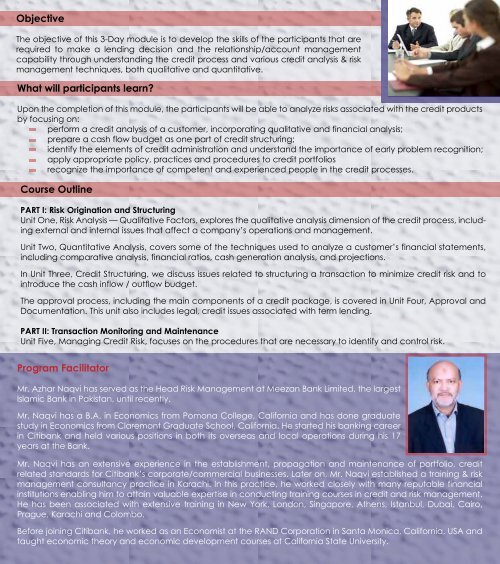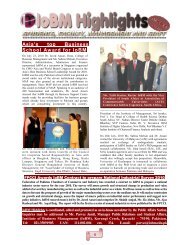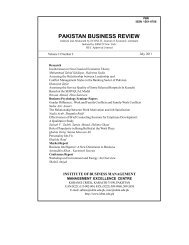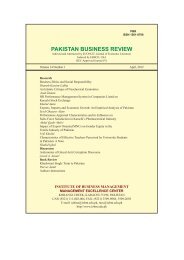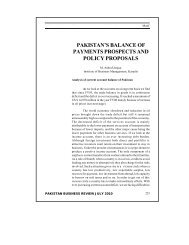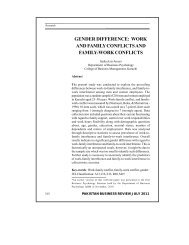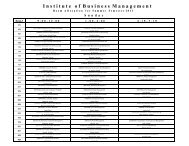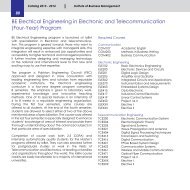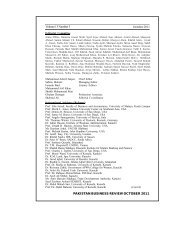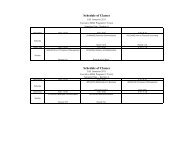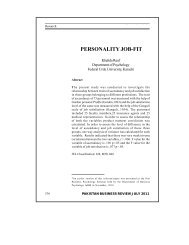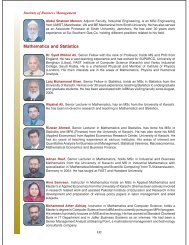Credit Analysis and Risk Management - Institute of Business ...
Credit Analysis and Risk Management - Institute of Business ...
Credit Analysis and Risk Management - Institute of Business ...
You also want an ePaper? Increase the reach of your titles
YUMPU automatically turns print PDFs into web optimized ePapers that Google loves.
Objective<br />
The objective <strong>of</strong> this 3-Day module is to develop the skills <strong>of</strong> the participants that are<br />
required to make a lending decision <strong>and</strong> the relationship/account management<br />
capability through underst<strong>and</strong>ing the credit process <strong>and</strong> various credit analysis & risk<br />
management techniques, both qualitative <strong>and</strong> quantitative.<br />
What will participants learn?<br />
Upon the completion <strong>of</strong> this module, the participants will be able to analyze risks associated with the credit products<br />
by focusing on:<br />
perform a credit analysis <strong>of</strong> a customer, incorporating qualitative <strong>and</strong> financial analysis;<br />
prepare a cash flow budget as one part <strong>of</strong> credit structuring;<br />
identify the elements <strong>of</strong> credit administration <strong>and</strong> underst<strong>and</strong> the importance <strong>of</strong> early problem recognition;<br />
apply appropriate policy, practices <strong>and</strong> procedures to credit portfolios<br />
recognize the importance <strong>of</strong> competent <strong>and</strong> experienced people in the credit processes.<br />
Course Outline<br />
PART I: <strong>Risk</strong> Origination <strong>and</strong> Structuring<br />
Unit One, <strong>Risk</strong> <strong>Analysis</strong> — Qualitative Factors, explores the qualitative analysis dimension <strong>of</strong> the credit process, including<br />
external <strong>and</strong> internal issues that affect a company’s operations <strong>and</strong> management.<br />
Unit Two, Quantitative <strong>Analysis</strong>, covers some <strong>of</strong> the techniques used to analyze a customer’s financial statements,<br />
including comparative analysis, financial ratios, cash generation analysis, <strong>and</strong> projections.<br />
In Unit Three, <strong>Credit</strong> Structuring, we discuss issues related to structuring a transaction to minimize credit risk <strong>and</strong> to<br />
introduce the cash inflow / outflow budget.<br />
The approval process, including the main components <strong>of</strong> a credit package, is covered in Unit Four, Approval <strong>and</strong><br />
Documentation. This unit also includes legal, credit issues associated with term lending.<br />
PART II: Transaction Monitoring <strong>and</strong> Maintenance<br />
Unit Five, Managing <strong>Credit</strong> <strong>Risk</strong>, focuses on the procedures that are necessary to identify <strong>and</strong> control risk.<br />
Program Facilitator<br />
Mr. Azhar Naqvi has served as the Head <strong>Risk</strong> <strong>Management</strong> at Meezan Bank Limited, the largest<br />
Islamic Bank in Pakistan, until recently.<br />
Mr. Naqvi has a B.A. in Economics from Pomona College, California <strong>and</strong> has done graduate<br />
study in Economics from Claremont Graduate School, California. He started his banking career<br />
in Citibank <strong>and</strong> held various positions in both its overseas <strong>and</strong> local operations during his 17<br />
years at the Bank.<br />
Mr. Naqvi has an extensive experience in the establishment, propagation <strong>and</strong> maintenance <strong>of</strong> portfolio, credit<br />
related st<strong>and</strong>ards for Citibank’s corporate/commercial businesses. Later on, Mr. Naqvi established a training & risk<br />
management consultancy practice in Karachi. In this practice, he worked closely with many reputable financial<br />
institutions enabling him to attain valuable expertise in conducting training courses in credit <strong>and</strong> risk management.<br />
He has been associated with extensive training in New York, London, Singapore, Athens, Istanbul, Dubai, Cairo,<br />
Prague, Karachi <strong>and</strong> Colombo.<br />
Before joining Citibank, he worked as an Economist at the RAND Corporation in Santa Monica, California, USA <strong>and</strong><br />
taught economic theory <strong>and</strong> economic development courses at California State University.


